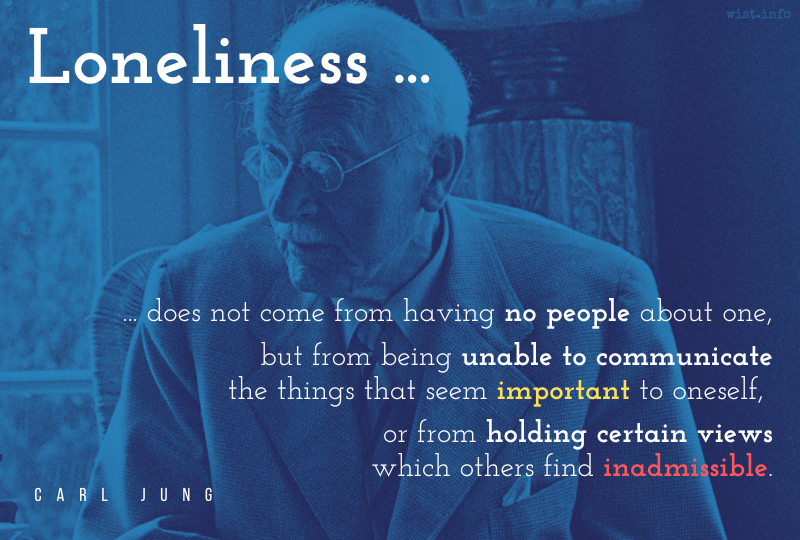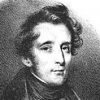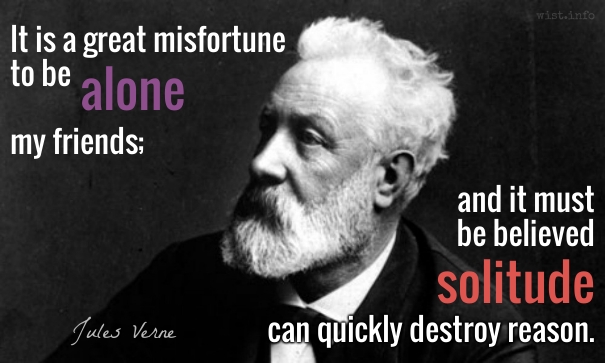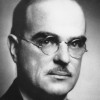One of the defining features of the Anthropocene is that the world is changing in ways that compel species to move, and another is that it’s changing in ways that create barriers — roads, clear-cuts, cities — that prevent them from doing so.
Elizabeth Kolbert (b. 1961) American journalist and author
The Sixth Extinction: An Unnatural History, ch. 9 “Islands on Dry Land” (2014)
(Source)
Quotations about:
isolation
Note not all quotations have been tagged, so Search may find additional quotes on this topic.
Loneliness does not come from having no people about one, but from being unable to communicate the things that seem important to oneself, or from holding certain views which others find inadmissible.
Carl Jung (1875-1961) Swiss psychologist
Memories, Dreams, Reflections [Erinnerungen, Träume, Gedanken], “Retrospect” (1962) [with Aniela Jaffé; tr. Winston (1963)]
(Source)
The parallels between Easter Island and the whole modern world are chillingly obvious. Thanks to globalization, international trade, jet planes, and the Internet, all countries on Earth today share resources and affect each other, just as did Easter’s dozen clans. Polynesian Easter Island was as isolated in the Pacific Ocean as Earth is today in space. When the Easter Islanders got into difficulties, there was nowhere to which they could flee, nor to which they could turn for help, nor shall we modern Earthlings have recourse elsewhere if our troubles increase. Those are the reasons why people see the collapse of Easter Island society as a metaphor, a worst-case scenario, for what may lie ahead of us in our own future.
Jared Diamond (b. 1937) American geographer, historian, ornithologist, author
Collapse: How Societies Choose to Fail or Succeed, Part 2, ch. 2 (2005)
(Source)
This is the actual full text from Diamond's book. It is almost universally paraphrased (including the bracketed inclusion) as:
The metaphor is so obvious. Easter Island isolated in the Pacific Ocean -- once the island got into trouble, there was no way they could get free. There was no other people from whom they could get help. In the same way that we on Planet Earth, if we ruin our own [world], we won't be able to get help.
I speculate that this pared-down phrasing was used by Diamond during a speech or seminar about the subject, or an interview about the book, and was then mistakenly identified (and copied) as a quote from the book. For example, at the ASA, CSSA, and SSSA Annual Meetings, Long Beach, California (2010), for example, Diamond is quoted with this near match:
The metaphor is so obvious. Easter Island is isolated in the Pacific Ocean; once the Easter Islanders got into trouble, there was nowhere that they could flee. Just as if, today, we on planet Earth mess up our island planet, there is no other galaxy that we’re going to be able to float off to.
Fear is a prison. But when you combine it with secrets, it becomes especially toxic, vicious. It puts us all into solitary, unable to hear one another clearly.
It is easy when you’ve been hurt by love to give it up as a bad job and make independence your new god, taking the love you had to give and turning it in upon yourself. And most of us have had to protect ourselves so much at times that we’ve given up the high road and taken the low. But independence carried to the furthest extreme is just loneliness and death, nothing more than another defense, and there is no growth in it, only a safe harbor for a while. The answer doesn’t lie in learning how to protect ourselves from life — it lies in learning how to become strong enough to let a bit more of it in.
Merle Shain (1935-1989) Canadian journalist and author
When Lovers Are Friends, ch. 1 (1978)
(Source)
Travelling, whatever may be said of it, is one of the saddest pleasures of life. When you feel yourself settled in some foreign city, it begins to feel, in some degree, like your own country; but to traverse unknown realms, to hear a language spoken which you hardly comprehend, to see human countenances which have no connection either with your past recollections, or future prospects, is solitude and isolation, without dignity and without repose.
[Voyager est, quoi qu’on en puisse dire, un des plus tristes plaisirs de la vie. Lorsque vous vous trouvez bien dans quelque ville étrangère, c’est que vous commencez à vous y faire une patrie; mais traverser des pays inconnus, entendre parler un langage que vous comprenez à peine, voir des visages humains sans relation avec votre passé ni avec votre avenir, c’est de la solitude et de l’isolement sans repos et sans dignité.]
Germaine de Staël (1766-1817) Swiss-French writer, woman of letters, critic, salonist [Anne Louise Germaine de Staël-Holstein, Madame de Staël, Madame Necker]
Corinne, Book 1, ch. 2 (1807) [tr. Lawler]
(Source)
Real loneliness is not necessarily limited to when you are alone.
Charles Bukowski (1920-1994) German-American author, poet
sifting through the madness for the Word, the line, the way, Part 2, epigram (2003)
(Source)
The book was reprinted as New Poems, Book Two (2011).
Totalitarianism appeals to the very dangerous emotional needs of people who live in complete isolation and in fear of one another.
Hannah Arendt (1906-1975) German-American philosopher, political theorist
Interview with Roger Errera (Oct 1973), The New York Review of Books (26 Oct 1978)
(Source)
Language is civilization itself. The Word, even the most contradictory word, binds us together. Wordlessness isolates.
Thomas Mann (1875-1955) German writer, critic, philanthropist, Nobel laureate [Paul Thomas Mann]
The Magic Mountain [Der Zauberberg], Part 6, “A Good Soldier” (1924) [tr. Woods]
(Source)
Alt. trans.: "Speech is civilization itself. The word, even the most contradictory word, preserves contact -- it is silence which isolates." [tr. Lowe-Porter]
Silence is the bluntest of blunt instruments. It seems to hammer you into the ground. It drives you deeper and deeper into your own guilt. It makes the voices inside your head accuse you more viciously than any outside voices ever could.
It’s a terrible thing to be alone — yes it is — it is — but don’t lower your mask until you have another mask prepared beneath — As terrible as you like — but a mask.
Katherine Mansfield (1888-1923) New Zealander writer, poet [pen name of Kathleen Mansfield Murry (née Beauchamp)]
Letter to John Middleton Murry (Jul 1917)
(Source)
Self-pity? I see no moral objections to it, the smell drives people away, but that’s a practical objection, and occasionally an advantage.
E. M. Forster (1879-1970) English novelist, essayist, critic, librettist [Edward Morgan Forster]
Commonplace Book (1985) [ed. Gardner]
(Source)
Who could deny that privacy is a jewel? I has always been the mark of privilege, the distinguishing feature of a truly urbane culture. Out of the cave, the tribal teepee, the pueblo, the community fortress, man emerged to build himself a house of his own with a shelter in it for himself and his diversions. Every age has seen it so. The poor might have to huddle together in cities for need’s sake, and the frontiersman cling to his neighbors for the sake of protection. But in each civilization, as it advanced, those who could afford it chose the luxury of a withdrawing-place.
Phyllis McGinley (1905-1978) American author, poet
“A Lost Privilege,” The Province of the Heart (1959)
(Source)
Although endlessly brooding on power, victory, defeat, revenge, the nationalist is often somewhat uninterested in what happens in the real world. What he wants is to feel that his own unit is getting the better of some other unit, and he can more easily do this by scoring off an adversary than by examining the facts to see whether they support him.
George Orwell (1903-1950) English writer [pseud. of Eric Arthur Blair]
“Notes on Nationalism” (1945)
(Source)
The cots, the palaces and valleys here,
Are nought to me, their charm, alas! is fled;
Floods, rocks, and forests, solitudes so dear
One soul is wanting, and all else seems dead[Que me font ces vallons, ces palais, ces chaumières,
Vains objets dont pour moi le charme est envolé?
Fleuves, rochers, forêts solitudes si chères,
Un seul être vous manque et tout est dépeuplé!]Alphonse de Lamartine (1790-1869) French poet and statesman
“Solitude [L’isolement],”Poetic Meditations [Méditations Poétiques] (1820) [tr. J. Churchill]
(Source)
Alt. trans. ["Isolation"]:
"What for me do these valleys, these palaces, these cottages,
Vain objects of which for me the charm has fled?
Streams, rocks, forests, solitudes so dear,
One single being from you is missing, and everything is depopulated."
Alt. trans.:
"Sometimes, when one person is missing, the whole world seems depopulated."
It is a great misfortune to be alone, my friends; and it must be believed that solitude can quickly destroy reason.
[Malheur à qui est seul, mes amis, et il faut croire que l’isolement a vite fait de détruire la raison.]
Jules Verne (1828-1905) French novelist, poet, playwright
The Mysterious Island, Part 2, ch. 15 (1874) [tr. White (1876)]
(Source)
External objects produce decided effects upon the brain. A man shut up between four walls soon loses the power to associate words and ideas together. How many prisoners in solitary confinement become idiots, if not mad, for want of exercise for the thinking faculty!
[Les objets extérieurs ont une action réelle sur le cerveau. Qui s’enferme entre quatre murs finit par perdre la faculté d’associer les idées et les mots. Que de prisonniers cellulaires devenus imbéciles, sinon fous, par le défaut d’exercice des facultés pensantes.]
Jules Verne (1828-1905) French novelist, poet, playwright
Journey to the Center of the Earth, ch. 26 (1864) [tr. Malleson (1877)]
(Source)
Never trust a country where the rich live behind high walls and tinted windows. That is a place that is not prospering as one country. That is a place where the rich not only say, “I don’t want you to see how I live,” but “I don’t want to see how you live.”
From these things therefore it is clear that the city-state is a natural growth, and that man is by nature a political animal, and a man that is by nature and not merely by fortune citiless is either low in the scale of humanity or above it, like the “clanless, lawless, hearthless” man reviled by Homer, for one by nature unsocial is also ‘a lover of war’ inasmuch as he is solitary, like an isolated piece at draughts.
[ἐκ τούτων οὖν φανερὸν ὅτι τῶν φύσει ἡ πόλις ἐστί, καὶ ὅτι ὁ ἄνθρωπος φύσει πολιτικὸν ζῷον, καὶ ὁ ἄπολις διὰ φύσιν καὶ οὐ διὰ τύχην ἤτοι φαῦλός ἐστιν, ἢ κρείττων ἢ ἄνθρωπος: ὥσπερ καὶ ὁ ὑφ᾽ Ὁμήρου λοιδορηθεὶς “ἀφρήτωρ ἀθέμιστος ἀνέστιος:” ἅμα γὰρ φύσει τοιοῦτος καὶ πολέμου ἐπιθυμητής, ἅτε περ ἄζυξ ὢν ὥσπερ ἐν πεττοῖς.]
Aristotle (384-322 BC) Greek philosopher
Politics [Πολιτικά], Book 1, ch. 2 / 1253a.2 [tr. Rackham (1932)]
(Source)
See Homer. Original Greek. Alternate translations:
From these considerations, therefore, it is clear that the State is one of Nature's productions, and that man is by nature a social animal, and that a man who is without a country through natural taste and not misfortune is certainly degraded (or else a being superior to man), like that man reviled by Homer as clanless, lawless, homeless. For he is naturally of this character and desirous of war, since he has no ties, like an exposed piece in the game of backgammon.
[tr. Bolland (1877)]
Hence it is evident that the state is a creation of nature, and that man is by nature a political animal. And he who by nature and not by mere accident is without a state, is either a bad man or above humanity; he is like the "tribeless, lawless, hearthless one," whom Homer denounces -- the natural outcast is forthwith a lover of war; he may be compared to an isolated piece at draughts.
[tr. Jowett (1885)]
Hence it is evident that a city is a natural production, and that man is naturally a political animal, and that whosoever is naturally and not accidentally unfit for society, must be either inferior or superior to man: thus the man in Homer, who is reviled for being "without society, without law, without family." Such a one must naturally be of a quarrelsome disposition, and as solitary as the birds.
[tr. Ellis (1912)]
From these things it is evident, then, that the city belongs among the things that exist by nature, and that man is by nature a political animal. He who is without a city through nature rather than chance is either a mean sort or superior to man; he is "without clan, without law, without hearth," like the person reproved by Homer; for the one who is such by nature has by this fact a desire for war, as if he were an isolated piece in a game of backgammon.
[tr. Lord (1984)]
Love anything and your heart will be wrung and possibly broken. If you want to make sure of keeping it intact you must give it to no one, not even an animal. Wrap it carefully round with hobbies and little luxuries; avoid all entanglements. Lock it up save in the casket or coffin of your selfishness. But in that casket — safe, dark, motionless, airless — it will change. It will not be broken; it will become unbreakable, impenetrable, irredeemable. To love is to be vulnerable.
The single most dangerous thing you can do in politics is shut off information from people who don’t agree with you. Surround yourself with sycophants, listen only to the yea-sayers … then stick a fork in it, you’re done.

























